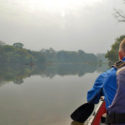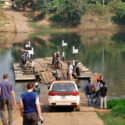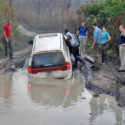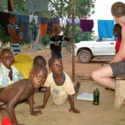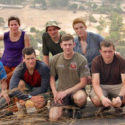Exercise Bintumani Spirit took place in February 2013 in Sierra Leone, West Africa. The expedition consisted predominantly of regular Royal Corps of Signals personnel, but we were joined by Capt Clare Bliss of 243 (V) Field Hospital who came to provide essential medical support.
Exercise Bintumani Spirit was an innovative AT expedition, especially given its unique choice of location. The aim of the expedition was to summit the highest mountain in Sierra Leone, Mount Bintumani (1950m). Prior to this the intention was to spend a period of time acclimatising at the Outamba-Kilmi National Park in the north-west of the country and conducting a number of introductory walks and allowing personnel to adjust to the heat.
The expedition personnel were introduced to the hustle and bustle of Sierra Leone with an early morning landing into Lungi Airport, followed by a three hour journey across dirt roads to the city of Makeni. After a short break the team continued to Kamakwie, for an overnight break. The following day we arrived at Outamba-Kilmi National Park, a truly remote location dotted with idyllic huts for us to stay in. From the park we conducted a canoe safari, viewing hippos in their natural habitat from a safe distance. We also did several walks deeper into the national park, hoping to see chimpanzees and elephants. Sadly we had no success due to the recent bushfire that had stripped the landscape of much of its vegetation. The walks served their purpose though and all personnel became aware of the effect that the intense heat would have on their bodies even after only walking for a relatively short period of time.
After departing Outamba-Kilmi we returned to Makeni to prepare ourselves for our main effort, the ascent of Mount Bintumani. The guidebook said that getting to the mountain would be harder than the climb itself; it wasn’t wrong. We knew the roads to the trailhead would be fairly bad, but nothing prepared us for quite how bad they were. The smaller roads leading deep into the mountains were little more than dirt tracks and were littered with ruts, rocks and boggy patches. We averaged a speed of about 15km an hour and got stuck on more than one occasion, resulting in a number command task style exercises, only with no time limit or option of failure! Unfortunately our first attempt at reaching the village of Yfin, where we were due to start trekking from, was halted by a collapsed bridge. The bridge had originally consisted of a number of logs, but a lorry had tipped over and broken half of them making it impossible to cross; the wreck of the lorry was still on its side in the river below.
After being granted permission from the village chief to camp at the local school and getting some rest overnight we made our way, painfully, back to the main road to attempt an approach from the North. Our intention was to reach the village of Sinikoro and start the trek from there instead. Again, once we left the main roads our journey became painfully slow. As dusk descended we reached a wide river crossing and decided not to attempt the crossing until first light on safety grounds. In the morning one vehicle successfully crossed the river but failed to make it up the steep river bank on the other side; it could not gain enough traction on the loose sand. We were too far away to walk to the trailhead and there was no time left to try any other route, so sadly our effort to climb Mount Bintumani ended at this point.
With much regret we took our picture next to the river that had defeated us and began retracing our steps to the main road, again! We did manage to summit a couple of other peaks in the country, including Wusum Hill in Makeni and Sugar Loaf in Freetown. However, despite not achieving of main objective Exercise Bintumani Spirit was still a worthwhile venture, exposing individuals to a new, unusual culture, and placing members the team outside their comfort zone and in testing situations.

